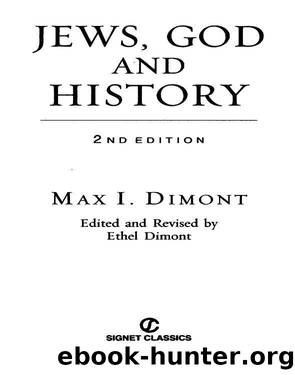Jews, God, and History by Max I. Dimont

Author:Max I. Dimont
Language: eng
Format: epub
Publisher: Penguin Publishing Group
Published: 2010-02-28T16:00:00+00:00
The rulers of seventeenth- and eighteenth-century Europe were quick to sense the Jewish genius in financial affairs. Jews were recalled to the West, and there they created international banking institutions that made history. But this phase of Jewish history in the West properly falls in the Modern Age.
More properly part of medieval Jewish history and an amazing new phenomenon is the Court Jew, who arose in Central Europe, especially in German-speaking countries. It is only recently that historians have taken his role seriously. Modern historians who are examining the Court Jew and his functions are coming up with new verdicts.
The Court Jew was the prototype not so much for the international banker of the 1900s as he was for the Secretary of the Treasury or for the Chancellor of the Exchequer today. His function was not only to serve as quartermaster general for the army, financial agent for the prince, master of the mint, but also to create new sources for revenue, negotiate loans, float debentures, devise new taxes. In short, the Court Jew set the pattern for emancipating the ruler from the nobles by modern financing methods. Of the two hundred main grand duchies, principalities, and palatinates 48 in the Holy Roman Empire after the Thirty Yearsâ War, almost all had Court Jews. Even Charles V, the most Catholic of all emperors, beholden to the Jesuits, had a Hofjude, Court Jew, Jossl of Rosheim, who was his mint-master and financier, and so powerful that the Emperor dared not dispense with his services.
The Court Jews were absolutely loyal to the prince who protected them. They could come and go as they pleased. They wined and dined with the heads of state. Often they were the possessors of titles. But they never forgot their brothers in the ghettos. The Court Jew was their intermediary and contributed heavily to their weal. Though most Court Jews could have risen to the highest positions of state had they only converted, the remarkable aspect is that they refused to do so. But this refusal to convert is not what merited them the hate they sowed in the hearts of the nobles. The Court Jew was a revolutionary figure who heralded the coming of the radical capitalist state, which would do away with the power and privileges of the nobles. In the Court Jew the nobles correctly foresaw their doom.
The three centuries of Court Jews produced many colorful individuals and adventurous careers. Perhaps the most colorful and adventurous was that of Joseph Suss Oppenheimer (1698-1738), finance minister to Duke Charles I (Karl Alexander) of Württemberg. Oppenheimer is looked upon today as the prototype of the modern financier-statesmen, who by their skillful financial innovations set the pattern for emancipating the kings from the nobles. For this, Oppenheimer was bitterly hated by the nobles of Württemberg, who, not realizing that their system had already been relegated to the backwash of history, attributed all their troubles to him.
Oppenheimerâs dramatic career became the theme for Lion Feuchtwangerâs historical novel, Power.
Download
This site does not store any files on its server. We only index and link to content provided by other sites. Please contact the content providers to delete copyright contents if any and email us, we'll remove relevant links or contents immediately.
Down the Drain by Julia Fox(983)
The Light We Carry by Michelle Obama(902)
Cher by Cher(798)
Simple Passion by Annie Ernaux(747)
Love, Pamela by Pamela Anderson(606)
The Nazis Knew My Name by Magda Hellinger & Maya Lee(579)
Zen Under Fire by Marianne Elliott(565)
You're That Bitch by Bretman Rock(551)
Novelist as a Vocation by Haruki Murakami(543)
Alone Together: Sailing Solo to Hawaii and Beyond by Christian Williams(536)
The Foxfire Book of Appalachian Women by Kami Ahrens(531)
Kamala Harris by Chidanand Rajghatta(497)
Gambling Man by Lionel Barber(491)
The Barn by Wright Thompson(440)
Drinking Games by Sarah Levy(430)
A Renaissance of Our Own by Rachel E. Cargle(418)
Limitless by Mallory Weggemann(417)
A new method to evaluate the dose-effect relationship of a TCM formula Gegen Qinlian Decoction: âFocusâ mode of integrated biomarkers by unknow(417)
Memoirs of an Indian Woman by Shudha Mazumdar Geraldine Hancock Forbes(415)
